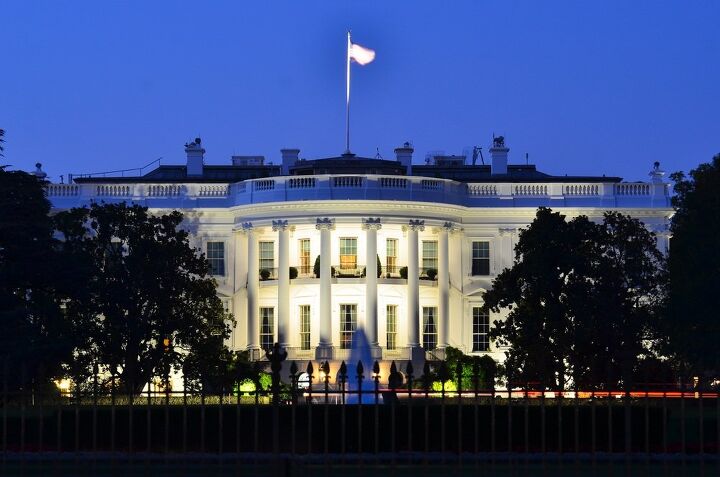Automakers Accused of Chip Hoarding, U.S. Considers Defense Production Act

Despite the occasional media report claiming that the semiconductor shortage is nearly over, reality looks quite a bit different. Some manufacturers have managed to temporarily stabilize supply chains, even though others have continued announcing work stoppages as they run out of chips. Wait times for the electronic components have also increased by about 61 percent since the beginning of 2021. Meanwhile, a recent Kelly Blue Book survey had 48 percent of respondents saying they were going to postpone buying a new automobile until shortages end, prices come down, and they can actually find the vehicles they’re looking for. But even those that were willing to buy now expressed a surprising level of acceptance to abandon brand loyalty or their preferred body style just to get a fairer deal on an automobile.
With the United States fairing worse than other regions in regard to chip availability, the White House has been under pressure to solve the problem all year. Thus far, government strategy has focused on encouraging investments for new semiconductor production. But there’s a new gambit being proposed that would invoke a Cold War-era national security law that would force manufacturers to furnish information pertaining to semiconductor supply lines and chip sales.
The plan has already been put into action, though it’s technically voluntary at this time. According to Bloomberg, the U.S. Department of Commerce has asked companies to complete questionnaires within the next 45 days that offer a glimpse into their inventories and the status of their supply lines. Commerce Secretary Gina Raimondo made the announcement on Thursday, adding that she could soon make it mandatory by invoking the Defense Production Act (DPA) to force manufacturers to comply.
“What I told them is, ‘I don’t want to have to do anything compulsory but if they don’t comply, then they’ll leave me no choice,'” she said. “I said today we’re evaluating all of our options right now, all the tools. I hope not to go there but we need to see some progress and we definitely need compliance.”
That sort of undermines the whole voluntary angle the Commerce Department led with. But, if you’re surprised that the government is willing to perpetually force its will by now, I don’t really know what to tell you.
There is a long history of the DPA being used outside the confines of a wartime environment. Passed during the Korean War in 1950, the Department of Defense repeatedly used it to make sure the national infrastructure was robust enough to endure attacks. It was later used to build up new DOD-backed technologies. In 2011, President Barack Obama invoked the law to force telecommunication firms to provide information regarding their use of foreign-manufactured hardware and software. Donald Trump later used it in 2017 to categorize materials that would be essential to national security and then again as a way to ensure certain sectors of the economy (mostly food production) would remain open during COVID lockdowns.
Within two days of taking office, Joe Biden also invoked the Defense Production Act to increase the production of supplies related to the pandemic, mainly personal protective equipment. Two months later, he did it again. This time the goal was to make it easier for facilities to manufacture COVID vaccines. In September, his third use of the DPA occurred to increase the production of hoses so that the U.S. Forest Service could have more equipment to fight wildfires on the West Coast.
Now the White House is eyeballing the act as a way to monitor manufacturers. But it’s not entirely clear how Raimondo expects this to play out in regard to semiconductors or which companies this is going to apply to. Even though the automotive industry has been coping with chip shortages for months, it’s hardly the only business sector that utilizes them.
From Bloomberg:
U.S. officials have repeatedly emphasized that the private sector must step up and provide more transparency if the government is to successfully address the shortage.
The Commerce chief and National Economic Council Director Brian Deese held meetings with companies Thursday to stress that point again. Raimondo said the first session “went very well” and participants were “extremely constructive.”
The information request — and potential enforcement through DPA or other means — is necessary because there’s a lack of trust among companies in the supply chain, she said.
“There’s allegations of certain consuming companies buying two or three times what they need and stockpiling,” Raimondo said. “So suppliers say, ‘We can’t get a handle on an accurate demand signal because consumers are stockpiling, so we don’t know what the accurate demand is.’ Some consumers are saying ‘We can’t get straight answers from suppliers, how come I was told I could have X and now I’m being told I can only have half of X?'”
Ah-ha! So it’s the dirty damn manufacturers that are causing the problem by hoarding all the chips for themselves … or the suppliers who aren’t giving an accurate account of how many parts they’re moving around the planet. Perhaps both?
We know that the automotive industry hasn’t been hurting as badly as it might seem at a glance. While automotive production has remained heavily suppressed since the start of 2020, profits are still fairly healthy. Companies have managed to slash overhead by issuing rolling layoffs whenever they run out of chips and having more staff work from home. But they’ve also been able to focus on high-margin vehicles and ask more for them while demand has increased due to shortages. Though they do seem broadly supportive of the White House’s plan to check in on them, suggesting that widespread malfeasance and secret chip hoarding may not be the case.
The Alliance for Automotive Innovation, which represents just about every major manufacturer on the planet, said it appreciated the government wanting to be involved. Though it stopped short of endorsing the invoking the DPA and hinted that it had things handled.
“Leaders from the semiconductor and automotive industries are working diligently to resolve the global chip shortage as quickly and efficiently as possible and are working to strengthen transparency and resiliency in the automotive semiconductor supply chain,” John Bozzella, CEO of the alliance, stated on Thursday. “Today’s discussion was an important opportunity to continue efforts to improve the automotive semiconductor supply chain and set the foundation for mid- and long-term capacity solutions.”
For what it’s worth, Stellantis separately said it would happily comply with the government — making it an unlikely candidate for semiconductor stockpiling.
While the government looking into warehouses to count chips sounds like it might not make much of a difference, there are some real economic ramifications here. Assuming companies bought more than they needed in a mad panic, the market is likely to crash if the coming months result in their not being needed. This is also the kind of thing investors would like to know in advance, which gives the White House an added incentive to pull the trigger on the Defense Production Act. However, nobody can say whether or not getting the federal government more involved is the correct course of action. Based upon how most things have been handled over the last few months, your author has his doubts that the DPA semiconductor tally would even be used responsibly.
[Image: Orhan Cam/Shutterstock]

A staunch consumer advocate tracking industry trends and regulation. Before joining TTAC, Matt spent a decade working for marketing and research firms based in NYC. Clients included several of the world’s largest automakers, global tire brands, and aftermarket part suppliers. Dissatisfied with the corporate world and resentful of having to wear suits everyday, he pivoted to writing about cars. Since then, that man has become an ardent supporter of the right-to-repair movement, been interviewed on the auto industry by national radio broadcasts, driven more rental cars than anyone ever should, participated in amateur rallying events, and received the requisite minimum training as sanctioned by the SCCA. Handy with a wrench, Matt grew up surrounded by Detroit auto workers and managed to get a pizza delivery job before he was legally eligible. He later found himself driving box trucks through Manhattan, guaranteeing future sympathy for actual truckers. He continues to conduct research pertaining to the automotive sector as an independent contractor and has since moved back to his native Michigan, closer to where the cars are born. A contrarian, Matt claims to prefer understeer — stating that front and all-wheel drive vehicles cater best to his driving style.
More by Matt Posky
Latest Car Reviews
Read moreLatest Product Reviews
Read moreRecent Comments
- ChristianWimmer It might be overpriced for most, but probably not for the affluent city-dwellers who these are targeted at - we have tons of them in Munich where I live so I “get it”. I just think these look so terribly cheap and weird from a design POV.
- NotMyCircusNotMyMonkeys so many people here fellating musks fat sack, or hodling the baggies for TSLA. which are you?
- Kwik_Shift_Pro4X Canadians are able to win?
- Doc423 More over-priced, unreliable garbage from Mini Cooper/BMW.
- Tsarcasm Chevron Techron and Lubri-Moly Jectron are the only ones that have a lot of Polyether Amine (PEA) in them.


































Comments
Join the conversation
I see no mentions of China strangling chip production here. They're reducing/cutting off power to all sorts of companies, like Foxconn and others which is causing all kinds of chaos in the chip supply chain. Fedgov can beat up Tesla or Ford all they want, it won't fix the issue.
If a manufacturer doesn't want to share their chips all they have to say is nacho chips.